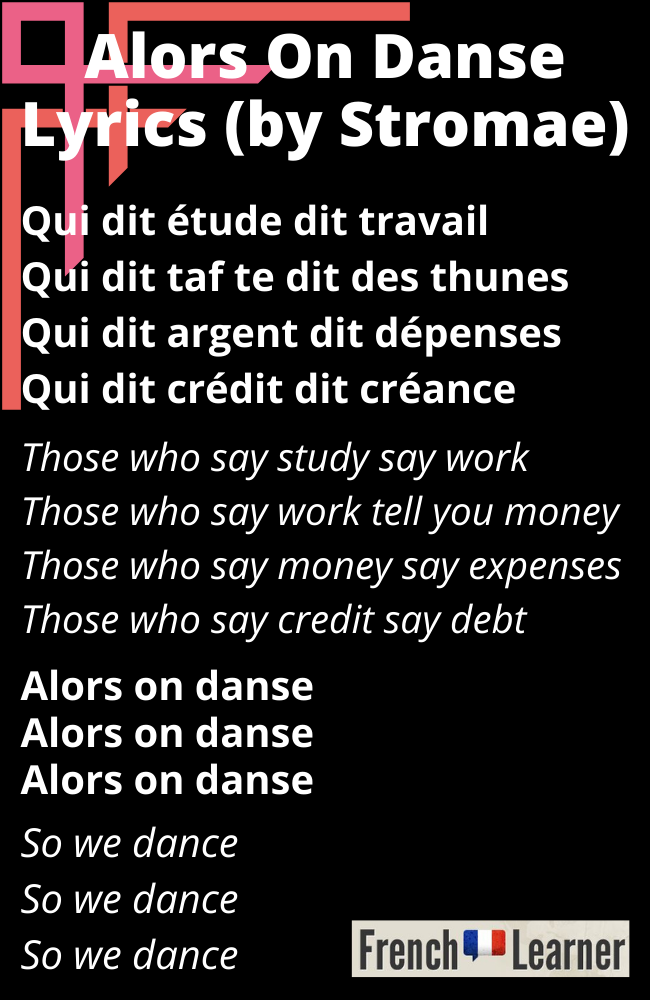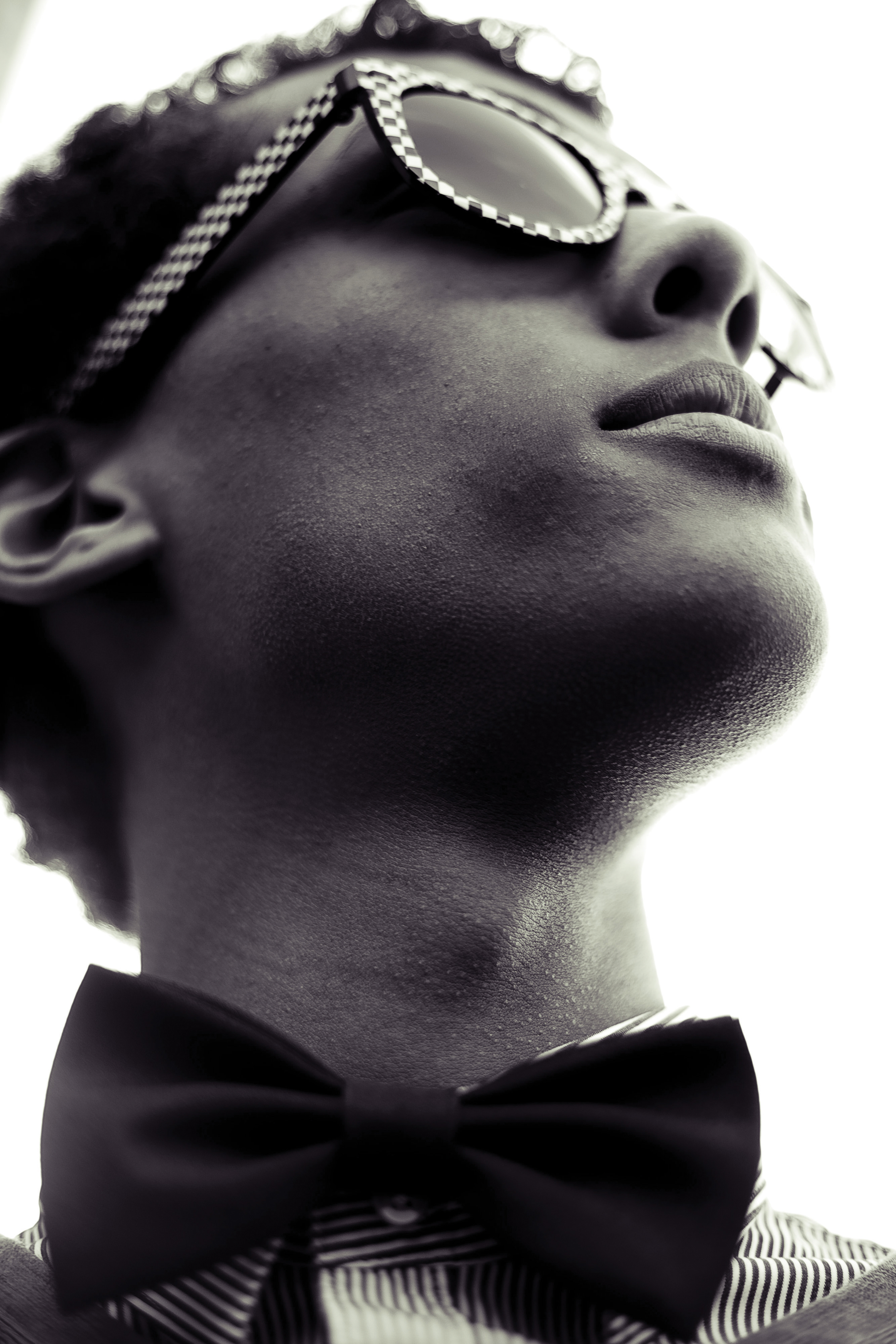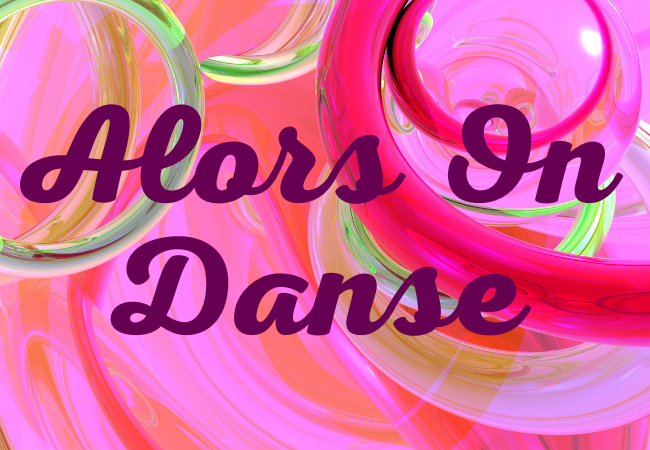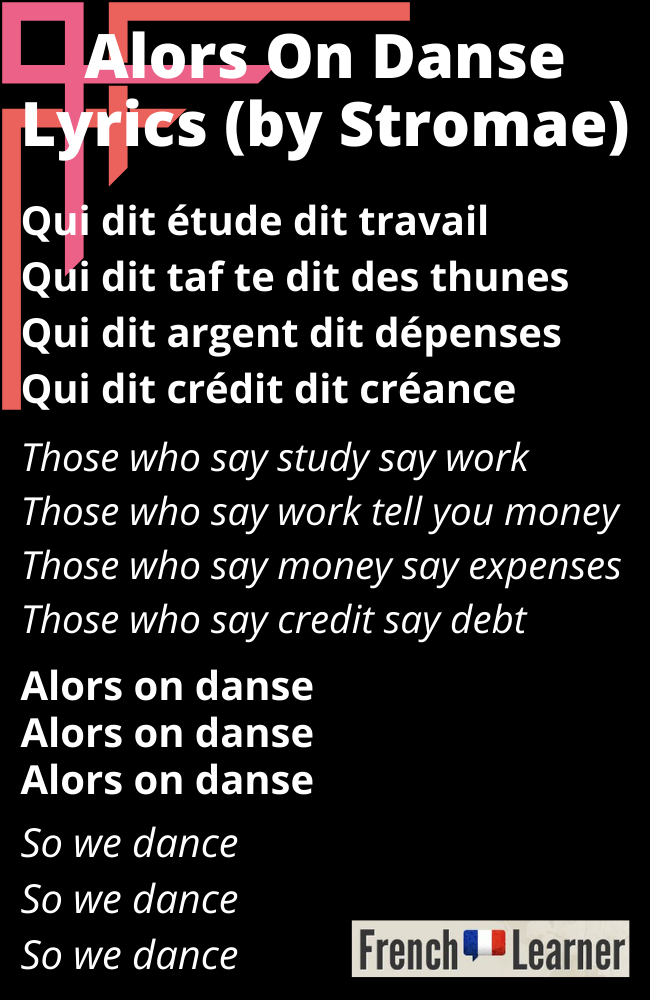Alors On Danse – Song background
“Alors On Danse” (pronounced alɔʁ ɔ̃ dɑ̃s) is a major hit song by Belgian singer Stromae. The title of the song “Alors On Danse” translates to “So We Dance”. The song was released in 2009 and soared to the top of the charts in many European counties and in Canada. This post provides in-depth explanation of the song lyrics vocabulary and grammar.

Listen to Alors On Danse in YouTube and Spotify
We have included both YouTube and Spotify embeds where you can listen to the song before delving deeper into the lyrics (see below).
Lyrics and music video synopsis
We believe both the message of the song “Alors On Dance“ have to do with young people struggling in dead-end jobs then hopefully finding their calling in life.
In the music video, the song starts with Stomae working in a office with cubicle. He’s given a pile of paperwork by a female college then given more by a male college who could be his boss.
During the first first verse of the lyrics, Stomae sings about the “rat race” effect on life: Chronic problems with work, finances and family. In the video he goes home, greets his wife and child, then leaves immediately. As he’s walking he appears to want to help a homeless man who in turn steals his jacket.
Stromae then enters a pub where other men and women are drinking, singing and having a good time. Initially, Stomae looks miserable, loosens his tie and starts drinking.
In the end, Stomae ends up having a good time. He is hoisted up by the crowd of dancers, blindfolded, then put on a stage where he starts singing and becomes his true “entertaining” self.
Both the song and music video end with Stromae happily singing for very large group of people. Through the process of getting kicked out of the office, fighting with his family and finally making it to the pub, Stromae finds his true happiness in life. Alors on dance – so dance.

Alors On Danse – Song title meaning explained
The song title, “Alors On Danse”, has multiple meanings. The French word “alors” has can translate to both “so” and “then”. The personal pronoun “on” has several translations and usages. It can mean “we”, as in “you and me”. It can also mean “you” as in people in general.
Thus, based on the explanation above, “Alors On Danse” has multiple translations including “So We Dance”, “So You Dance”, “Then We Dance” and finally “Then You Dance”.
Note that the title of the song is not spelled “Alors On Dance”. This is a common mistake. The French verb danser (to dance) is spelt with an -s and not a -c.
Line-by-line lyrics analysis of the French lyrics
In the following section we have hand-picked lines which we think offer interesting glimpses into French grammar and vocabulary. The lyrics to this song contain a lot of French slang.
Alors on
The song opens with the lines “Alors on”. This translates to “so we…”.
Qui dit études dit travail
This line translates literally to “Who says study says work”. This opening line underscores the lines that follow. Stomae is expressing that while one is saying “one”, they’re really being hypocritical and saying something else.
We believe these lines are all ways of expressing being fed up with societal norms such as getting an education, career and raising a family.
Qui dit taf te dit des thunes
We translated this line to “Those who say work tell you money”. “Qui dit” can also be translated to “those who say”. The slang words taf mean work and thune mean money.
Qui dit argent dit dépenses
This line translates to “Those who say money say expenses”. The verb dépenser means to spend (money).
Qui dit crédit dit créance
This line translates to “Those who say credit say debt”. The word “créance” means debt and is related to the word “crédit“.
Qui dit dette, te dit huissier
This line translates to “Those who say debt say court bailiff”. Huisser translates to both court bailiff and usher.
Oui dit assis dans la merde
This line was difficult to translates. Our translation was “Yes he said you’re in deep sh*t”. The translation of “assis” is seated or sitting in.
This line is implying that getting trouble can result of the common debts one can experience during adulthood.
Qui dit amour, dit les gosses
This line translates to “Those who say love say kids”. In this line Stromae is taking a cynical view of falling in love and having a family. The word gosse is slang for kid or child.
Dit toujours et dit divorce
This line is a continuation of the previous line and translates to: “Say forever and say divorce”. Again the view of family is cynical: Falling in love and having kids will result in debt, problems and divorce.
Qui dit proches, te dit deuils
Again, another line suggesting a cynical view on family in relatives: “Those who say relatives say death”. In French, proche has to meanings: relatives and emotional closeness.
Car les problèmes ne viennent pas seul
This line translates to “Because these problems don’t come alone”. Here, Stromae is suggesting that the problems of adulthood tend to pile up.
Qui dit crise, te dit monde, Dit famine et dit tiers monde
These two lines translate to “Those who say crisis tells you world, tell you famine and third world”. From this line on, Stomae projects the cynical view of life onto the entire world.
Qui dit fatigue dit réveil
This line translates to “Those who say fatigue say wake up”. We believe Stomae is suggesting there’s no end to this tiring cycle of cynicism.
Encore sourd de la veille, Alors on sort pour oublier tous les problèmes
These two lines translate to “Still deaf the next day, So we go out to forget about all the problems”. These two lines provide a smooth transition into the next portion of the lyrics where he’s out singing, dancing and having fun.
Et là tu t’dis que c’est fini
We translated this line to “And you say it’s finished”. The t’ is a shortening of te, which is an object pronoun meaning “to yourself”.
The French word “là” translates to “there” but can appear in the spoken language as a particle word without any translatable meaning.

Car pire que ça, ce s’rait la mort
This line translates to “Because worse than that, would be death”. The word “car” means because. “S’rait” is a shortening of “serait“, which means “would be”. The page covers all of the conjugations of être (to be).
Quand tu crois enfin qu’tu t’en sors
We translated this line to “When you think you’re finally emerging (from a difficult situation)”. The verb “s’en sortir” can translate to “to get by”, “to get through”, or “emerge greater”. All of the meanings underscore getting out of a bind or difficult situation.
Quand y en a plus, et ben y en a encore
We translated this line to “When there’s more, well there’s more”. “Y en a” is a shortening of “Il y en a“, which means there is some.
Est-ce la zik ou les problèmes, Les problèmes ou bien la musique ?
These lines translate to “Is it music or problems? / Problems or rather music?”. Zik is slang for “musique“. We believe Stromae is presenting his listeners with a choice in life: Compounding problems of adulthood or just letting go and enjoying singing and dancing.
Ça t’prend les tripes, ça te prend la tête
This line translates to “It takes your heart and soul, it bothers you”. There are two slang expressions here. Les tripes translates to “heart and soul”. The expression “prendre la tête” has an underlying meaning of being annoyed or bothered.
Et puis tu pries pour qu’ça s’arrête
This line translates to “And you pray for it to stop”. Here, we think Stromae is referring to the madness of the early adulthood rat race.
Mais c’est ton corps, c’est pas le ciel
This line translates to “But it’s your body, it’s not the sky”. We had a difficult time understanding the underlying meaning of this line. We believe it has to do with life’s material versus spiritual realms and peoples’ inner conflicts.
Alors tu t’bouches plus les oreilles, Et là tu cries encore plus fort, et ça persiste
These two lines translate to “So you plug your ears more, And you scream even louder, and it persists”. We believe that again Stomae is alluding to peoples’ inner conflict between material wealth and career success and real inner happiness.

Alors On Danse French Lyrics & English Translation
Alors on-
Alors on-
Alors on-
So we…
So we…
So we…
Qui dit étude dit travail
Qui dit taf te dit des thunes
Qui dit argent dit dépenses
Qui dit crédit dit créance
Qui dit dette, te dit huissier
Lui dit assis dans la merde
Qui dit amour, dit les gosses
Dit toujours et dit divorce
Qui dit proches, te dit deuils
Car les problèmes ne viennent pas seul
Qui dit crise, te dit monde
Dit famine et dit tiers monde
Qui dit fatigue dit réveil
Encore sourd de la veille
Alors on sort pour oublier tous les problèmes
Those who say study say work
Those who say work tell you money
Those who say money say expenses
Those who say credit say debt
Those who say debt say court bailiff
Yes he said you’re in deep sh*t
Those who say love say kids
Say forever and say divorce
Those who say relatives say death
Because these problems don’t come alone
Those who say crisis tells you world
Tell you famine and third world
Those who say fatigue say wake up
Still deaf the next day
So we go out to forget about all the problems
Alors on danse
Alors on danse
Alors on danse
Alors on danse
Alors on danse
Alors on danse
Alors on danse
Alors on danse
Alors on danse
So we dance
So we dance
So we dance
So we dance
So we dance
So we dance
So we dance
So we dance
So we dance
Et là tu t’dis que c’est fini
Car pire que ça, ce s’rait la mort
Quand tu crois enfin qu’tu t’en sors
Quand y en a plus, et ben y en a encore
Est-ce la zik ou les problèmes ?
Les problèmes ou bien la musique ?
Ça t’prend les tripes, ça te prend la tête
Et puis tu pries pour qu’ça s’arrête
Mais c’est ton corps, c’est pas le ciel
Alors tu t’bouches plus les oreilles
Et là tu cries encore plus fort, et ça persiste
And you say it’s finished
Because worse than that, would be death
When you think you’re finally emerging (from a difficult situation)
When there’s more, well there’s more
Is it music or problems?
Problems or rather music?
It takes your heart and soul, it bothers you
And you pray for it to stop
but it’s your body, it’s not the sky
So you plug your ears more
And you scream even louder, and it persists
Alors on chante
Lalalalalala
Lalalalalala
Alors on chante
Lalalalalala
Lalalalalala
Alors on chante
Alors on chante
Et puis seulement quand c’est fini
So we sing
Lalalalalala
Lalalalalala
So we sing
Lalalalalala
Lalalalalala
So we sing
So we sing
And then only when it’s over
Alors on danse
Alors on danse
Alors on danse
Alors on danse
Alors on danse
Alors on danse
Alors on danse
Alors on danse
So we dance
So we dance
So we dance
So we dance
So we dance
So we dance
So we dance
So we dance
So we dance
Et ben y en a encore…
Well there’s still more…
More song lyrics lessons by David Issokson

